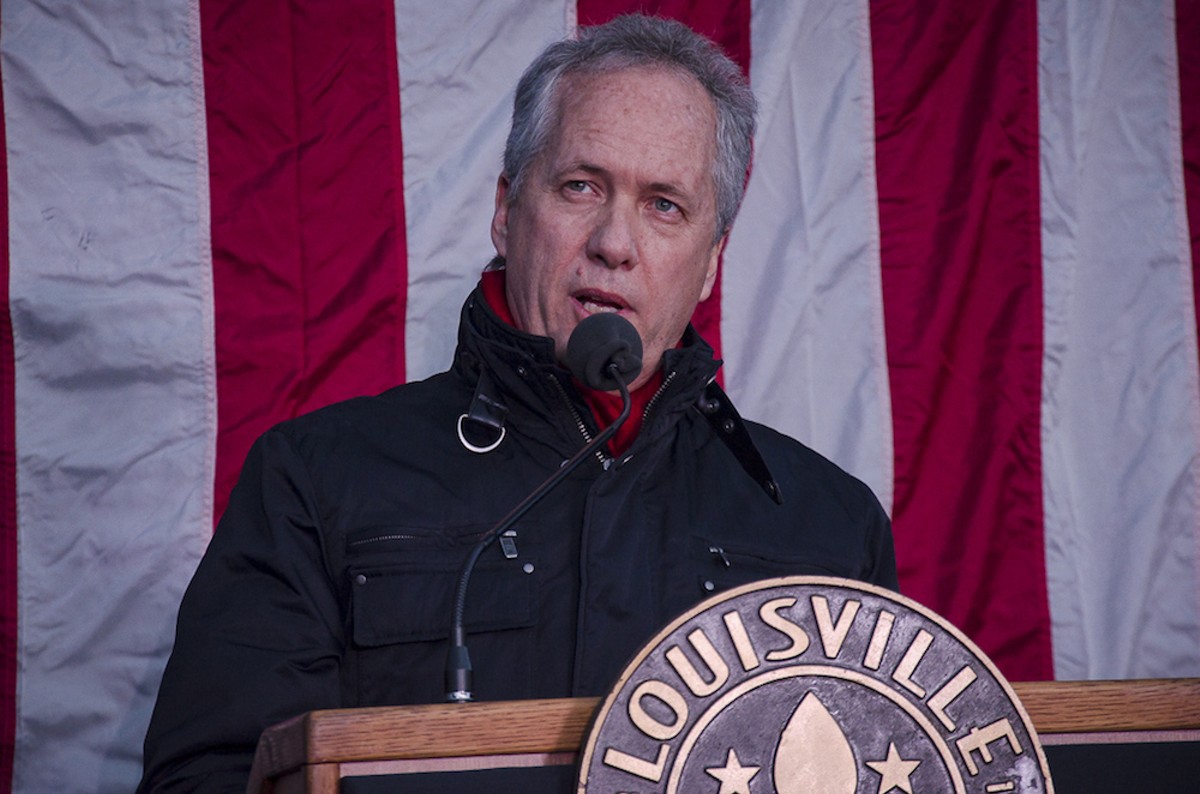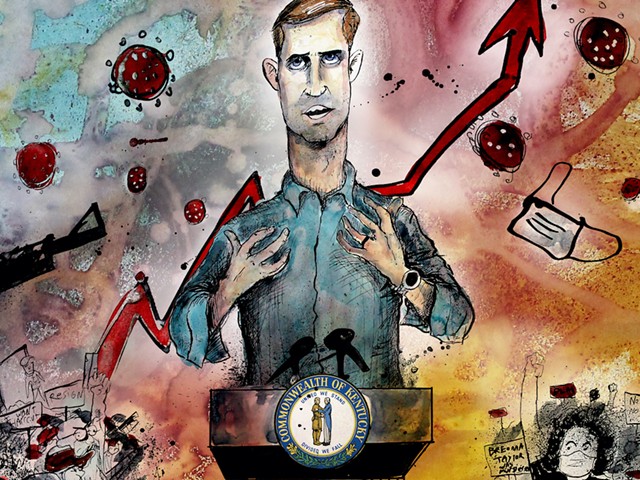The year 2020 really threw it all at us — a pandemic, killings by police officers that led to a racial justice movement, the further cementation of far-right conspiracy theories. These occurrences, besides stressing the hell out of us and, in some cases, bringing needed change, opened up potential pitfalls for our politicians. Even the ones, like Gov. Andy Beshear, who did well with some challenges — coronavirus— failed at others — protests in Louisville. But others were wholly swallowed by this past year’s myriad traps.
Below, we describe the gaffes and hypocritical snares that three Kentucky politicians, and one Hoosier lawmaker, found themselves in.
Mayor Greg Fischer: Walking away from the public
Mayor Greg Fischer’s response to Breonna Taylor’s death at the hands of Louisville police has received criticism for not being quick enough, drastic enough or transparent enough.This distant and delayed approach to the local racial justice movement is exemplified in a moment early on in the protests, captured in a video by former Kentucky Center for Investigative Reporting fellow Jewél Jackson. It has since been viewed over 129,000 times on Twitter.
On the third day of the protests, when Fischer appeared downtown — during the day, for a press conference — a woman named Jessica Sayles approached him, asking where he had been the night before.
Fischer said he didn’t know where Sayles was. She responded by bringing up concerns about militarized police and Taylor’s killers going unpunished, her voice loud and crackling with emotion.
All Fischer offered was “thank you”s, nodding and a hand wave before he walked away.
When asked about the interaction in an end-of-the-year interview, Fischer told LEO that he did not remember it, but said,“I spent, especially in the early days of the protests, I spent a lot of time talking with different protest groups and having private meetings with them as well.”Louisville Mayor Greg Fischer is confronted by a protestor on 4th Street. She asks “where were you last night?” pic.twitter.com/p8s8DOkSec
— Jewél Jackson (@JewlJackson1) May 30, 2020
Visible, Fischer has not always been, however.
When he released his recent comprehensive racial equity plan, community organizers that LEO spoke to said they were not consulted. Fischer’s office responded by saying that they had used existing sources of information to craft the plan, including the Build Back Better Together Initiative — a pandemic-recovery task force fueled by community input — and a letter submitted by local Black leaders with reforms called A Path Forward.
In his end-of-year interview, Fischer said, “I think what the important issue coming out of the protest to me is: How are we moving forward as a city? And you’ve seen our policy improvements, our police community legitimacy, our police reform, advancing racial equity initiatives, declaring racism as a public health crisis, our legislative agenda. So what’s important to me is that people feel like we’re moving forward as a city and moving beyond some of the legacy of institutional racism that’s not just here in Louisville.”
On Jan. 9, though, Fischer announced his pick for new Louisville police chief: Erika Shields, the Atlanta PD leader who resigned after the killing of Rayshard Brooks, a Black man, by a white police officer.
In an interview with the Courier Journal, a protester named Adrian Baker said, “They could’ve chosen anyone, and this is a decision you make?” he said. “Someone that already has that blood on their hands, and has left and has resigned because of that blood on their hands, and they come here, where there’s so much bloodshed, there’s so much anxiety, there’s so much pain, and they come here, where we need healing?”
In a tweet, CJ political cartoonist Marc Murphy said, “There will be explanations and we should listen but leadership is also about messaging. Selecting the #RayshardBrooks police chief to be the chief of #BreonnaTaylor’s city sends a message, whether intended or not.”
U.S. Sen. Mike Braun: Insurrection flip
Sen. Mike Braun of Indiana learned what can happen when you play to the depths of your base, even when you attempt to coat your actions with a respectable sheen.Braun was one of 11 Senate Republicans who signed a statement, saying they planned to vote against certifying Joe Biden’s election, citing “unprecedented allegations of voter fraud” and demanding an audit of results.
When supporters of President Donald Trump, frenzied by unproven claims of fraud, breached the Capitol on Jan. 6 in a failed insurrection, Braun reversed his decision not to certify, saying he “didn’t feel comfortable” with the day’s “events.”
At a Dec. 30 news conference, Braun himself told reporters that voter fraud “probably wasn’t systemic” and likely had “very little impact” on the election. But, he said, an audit would be worth it to “allay concerns and the fears of half the country that everything did work well.”
And Braun is still claiming election fraud. After the insurrection, he tweeted, “Though I will continue to push for a thorough investigation into the election irregularities many Hoosiers are concerned with as my objection was intended, I have withdrawn that objection and will vote to get this ugly day behind us.”
U.S. Rep. Thomas Massie: Incomplete science
Mr. MIT, U.S. Rep. Thomas Massie has a masters degree in mechanical engineering. And, since coronavirus hit, he’s often taken to Twitter to explain with graphs and statistics why he prefers a more hands-off approach to COVID-19.But, some of his arguments have holes, and, as is typical of Twitter, lack key context.
One of Massie’s favorite talking points has been herd immunity.
“When about half the population has been infected (and recovered) we have achieved herd immunity,” he tweeted on Oct. 8. “Those under 40 years of age make up over half the population, yet the virus is over 100 times less deadly to that portion of the population. Exploit this fact and defeat the virus!”
When LEO asked an epidemiologist about herd immunity back in August for a corona Q&A, Dr. Ana Bento said that, using the simplest model, 60% of Americans would have to contract COVID-19 to reach herd immunity. And the U.S. Centers for Disease Control and Prevention says on its website that scientists don’t know exactly how many people must be vaccinated to achieve herd immunity, either.
Massie didn’t address in his tweet how he would make sure those under the age of 40 don’t spread COVID-19 to the elderly. We imagine that it would require restrictive measures from the government that would surely go against his Libertarian leanings.
Massie has also criticized Kentucky’s mask mandates by sharing a graph in December that didn’t account for factors beyond case numbers or compare Kentucky to other states. And, he recklessly tweeted in October without context that he wouldn’t take a vaccine. He later clarified that this is because he tested positive for COVID antibodies, which still goes against CDC recommendations.
Some will say “but people didn’t comply,” however the reality is compliance has been high and as compliance has gone up, the curve has gotten steeper. If masks were ever going to work, there would have been a specification for particle size and fitment. https://t.co/CzsjJZEIMb
— Thomas Massie (@RepThomasMassie) December 11, 2020
I do hope a vaccine is developed soon, but I won’t be taking it.
— Thomas Massie (@RepThomasMassie) October 23, 2020
AG Daniel Cameron: Republican star's fall
Kentucky Attorney General Daniel Cameron started his job in December. He was 34, the first African American elected on his own ticket to hold statewide office and Mitch McConnell’s protégé.In March, Louisville police officers killed Breonna Taylor. By May, her case fell to Cameron. After months of investigation, he convened a grand jury.
Protesters and Black Lives Matter supporters were distraught when the jurors only charged one of the officers in the shooting, saddling him with misdemeanors for almost hitting white neighbors with bullets instead of the Black woman who died.
At the press conference proceeding the charges being announced, Cameron said the grand jury “agreed” that the two uncharged officers who were involved were justified in shooting at Taylor after her boyfriend, Kenneth Walker, fired at them in what he said was self defense.
Cameron might have thought his claim would go unchecked. But, a judge allowed grand jurors to speak out about the process.
Three grand jurors did, telling media outlets anonymously that they were not presented with the option of charging the other officers with more serious crimes like homicide.
“This was all Cameron. This was up to him. We didn’t get a choice in that at all,” one grand juror told CBS This Morning. “So, I was livid. By the time I heard what he was saying, everything that came out of his mouth, I was saying ‘liar’ — because we didn’t agree to anything.”
Now, Cameron’s reputation is forever tainted.






